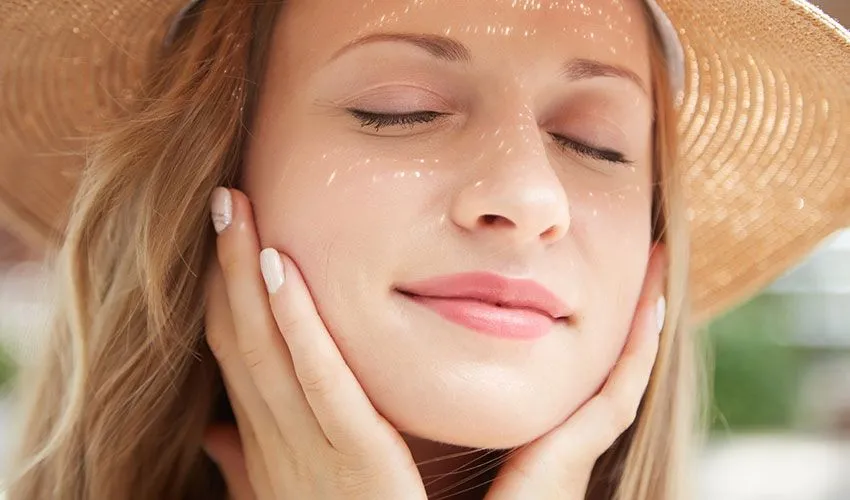Your cart is currently empty!
Summer Skincare Tips: How to Protect Your Skin from Sun Damage
Summer brings warmth, sunshine, and outdoor activities, but it also brings increased exposure to harmful UV rays. Protecting your skin from sun damage is essential for maintaining its health and youthful appearance. In this article, we’ll explore some effective summer skincare tips to help you safeguard your skin from the sun’s harmful effects.
Introduction
As the temperature rises and the days grow longer, it’s crucial to pay extra attention to your skincare routine. Sun exposure during the summer months can lead to sunburn, premature aging, and an increased risk of skin cancer. By following these summer skincare tips, you can enjoy the sun safely while keeping your skin healthy and radiant.
As the sun’s rays grow stronger and the temperatures rise, it’s time to prepare for the summer season ahead. With longer days and more time spent outdoors, protecting your skin from the sun’s harmful effects becomes paramount. In this introduction, we’ll delve into the importance of summer skincare and provide valuable tips on how to safeguard your skin from sun damage. From choosing the right sunscreen to maintaining hydration, we’ll explore key strategies to keep your skin healthy and radiant all summer long. So, let’s dive in and discover how to achieve beautiful, sun-protected skin this season.
Importance of Summer Skincare

During the summer, the sun’s UV rays are stronger, posing a greater risk to your skin. UV radiation can penetrate the skin’s layers, causing damage to cells, collagen, and DNA. This damage can manifest as sunburn, wrinkles, age spots, and even skin cancer. By prioritizing summer skincare, you can minimize the risk of sun damage and maintain your skin’s youthful glow. During the summer months, the sun’s rays become more intense, posing a greater risk to our skin. UV radiation can penetrate deep into the skin, causing damage to cells, collagen, and DNA.
This damage can lead to sunburn, premature aging, and an increased risk of skin cancer. Therefore, prioritizing summer skincare is essential to protect our skin from these harmful effects. By adopting a comprehensive skincare routine that includes sun protection, hydration, and after-sun care, we can minimize the risk of sun damage and maintain the health and vitality of our skin throughout the summer season.
Understanding Sun Damage

UV radiation from the sun can be divided into two main types: UVA and UVB rays. UVA rays penetrate deep into the skin, causing premature aging and contributing to the development of skin cancer. UVB rays primarily affect the skin’s surface, leading to sunburn and increasing the risk of skin cancer. Understanding the effects of UV radiation is essential for effective sun protection. Understanding the effects of sun damage is crucial for effective skincare during the summer months.
Sun exposure exposes our skin to harmful ultraviolet (UV) radiation, which can penetrate deep into the skin layers. UVA rays contribute to premature aging and skin cancer, while UVB rays primarily affect the skin’s surface, causing sunburn and increasing cancer risk. Over time, cumulative sun exposure can lead to wrinkles, age spots, and other signs of photoaging. By recognizing the impact of UV radiation, we can take proactive steps to protect our skin and minimize the risk of sun damage.
Choosing the Right Sunscreen

When it comes to sunscreen, not all products are created equal. Look for a broad-spectrum sunscreen with an SPF of at least 30 to protect your skin from both UVA and UVB rays. Apply sunscreen liberally to all exposed areas of skin, including your face, neck, arms, and legs. Reapply sunscreen every two hours, especially if you’re swimming or sweating. Selecting the appropriate sunscreen is crucial for effective sun protection during the summer months.
When shopping for sunscreen, opt for a broad-spectrum formula that offers protection against both UVA and UVB rays. Look for a sun protection factor (SPF) of at least 30, which blocks out 97% of UVB rays. Consider your skin type and preferences when choosing between lotions, creams, gels, or sprays. Additionally, check for water resistance if you’ll be swimming or sweating. Remember to apply sunscreen generously to all exposed areas of skin, and reapply every two hours for optimal protection throughout the day.
Hydration and Moisturization
Hydrated skin is more resilient to sun damage, so it’s essential to drink plenty of water and moisturize regularly during the summer months. Look for lightweight, non-comedogenic moisturizers that won’t clog pores or feel heavy on the skin. Hyaluronic acid, glycerin, and ceramides are excellent ingredients for hydrating the skin and maintaining its moisture barrier.
Maintaining proper hydration and moisturization is essential for healthy skin, especially during the summer months. The heat and sun exposure can lead to dehydration and dryness, making it crucial to replenish lost moisture. Drink plenty of water throughout the day to keep your skin hydrated from the inside out. Additionally, use a lightweight, non-comedogenic moisturizer to lock in moisture and prevent dryness. Look for products containing hydrating ingredients such as hyaluronic acid, glycerin, and ceramides. By prioritizing hydration and moisturization, you can keep your skin soft, supple, and well-nourished all summer long.
Tips for Sunburn Relief
Despite our best efforts, sunburns can still happen. If you find yourself with a sunburn, there are several steps you can take to alleviate discomfort and promote healing. Apply aloe vera gel or a soothing moisturizer to the affected area to reduce inflammation and provide relief from pain and itching. Avoid further sun exposure until your skin has healed completely.
Sunburn can be painful and uncomfortable, but there are several strategies you can employ to alleviate symptoms and promote healing.
- Cool Compress: Apply a cold, damp cloth or towel to the affected area to help soothe the burn and reduce inflammation.
- Hydrate: Drink plenty of water to stay hydrated and help your body recover from sunburn more quickly.
- Aloe Vera: Apply aloe vera gel to the sunburned skin to provide instant relief and promote healing. Aloe vera has anti-inflammatory properties that can help reduce redness and discomfort.
- Moisturize: Use a gentle, fragrance-free moisturizer to keep the skin hydrated and prevent peeling. Look for products containing ingredients like hyaluronic acid or ceramides.
- Avoid Further Sun Exposure: Protect the sunburned skin from further damage by staying out of the sun until it has healed completely. If you must go outside, wear protective clothing and apply sunscreen to prevent further sunburn.
Treating Hyperpigmentation
Hyperpigmentation, or dark spots, can develop on the skin as a result of sun exposure. To treat hyperpigmentation, look for skincare products containing ingredients like vitamin C, niacinamide, and retinoids. These ingredients can help fade dark spots and even out skin tone, giving you a more radiant complexion.
Hyperpigmentation, characterized by dark spots or patches on the skin, is a common concern, especially after sun exposure. Fortunately, several treatments can help diminish hyperpigmentation and even out skin tone. One effective approach is to incorporate skincare products containing ingredients like vitamin C, niacinamide, and retinoids into your routine.
These ingredients can help fade dark spots and promote skin cell turnover, resulting in a more even complexion over time. Additionally, consider professional treatments such as chemical peels, microdermabrasion, or laser therapy for more stubborn hyperpigmentation. With consistent treatment and sun protection, you can achieve a clearer, more radiant complexion.
Eye and Lip Care
Don’t forget to protect your eyes and lips from sun damage as well. Wear sunglasses with UV protection to shield your eyes from harmful rays, and apply lip balm with SPF to prevent sunburn and keep your lips moisturized. These simple steps can help protect these delicate areas from sun damage.
While focusing on protecting the skin from sun damage, it’s essential not to overlook the delicate areas around the eyes and lips. These areas are particularly vulnerable to sun exposure and can show signs of aging and damage more quickly. To protect the skin around your eyes, invest in a pair of sunglasses with UV protection and wear a wide-brimmed hat for added shade.
Additionally, apply a hydrating eye cream with SPF to protect against sun damage and minimize the appearance of fine lines and wrinkles. For the lips, use a lip balm with SPF to shield against UV rays and keep them moisturized throughout the day. By incorporating these simple yet effective strategies into your skincare routine, you can ensure comprehensive protection for your eyes and lips against sun damage.
After-Sun Care
After spending time in the sun, it’s essential to take care of your skin to prevent further damage and promote healing. Take a cool shower to soothe sunburned skin, and apply a moisturizing lotion or aloe vera gel to hydrate and nourish the skin. Drink plenty of water to stay hydrated from the inside out, and avoid further sun exposure until your skin has fully recovered.
After spending time in the sun, it’s essential to provide your skin with proper care to soothe and replenish it. One crucial step in after-sun care is to cool the skin down by taking a cool shower or applying a cold compress to reduce inflammation and discomfort. Hydrate your skin by applying a soothing moisturizer or aloe vera gel to replenish lost moisture and soothe any sunburned areas.
If your skin feels particularly sensitive or irritated, consider using products containing ingredients like chamomile or oat extract to calm and nourish the skin. Additionally, drink plenty of water to stay hydrated from the inside out. By following these after-sun care tips, you can help alleviate sunburn symptoms and support your skin’s recovery process.
conclusion
Summer skincare is crucial for maintaining the health and radiance of your skin while enjoying the warmer months. By following the summer skincare tips outlined in this article, you can protect your skin from sun damage, prevent premature aging, and reduce the risk of skin cancer. Remember to choose a broad-spectrum sunscreen, stay hydrated, and practice after-sun care to keep your skin looking its best. With these simple yet effective measures, you can enjoy the sun safely and maintain a youthful glow all summer long.
Prioritizing after-sun care is essential for maintaining the health and vitality of your skin during the summer months. Exposure to the sun’s harmful rays can lead to sunburn, dehydration, and premature aging. By following the tips outlined in this article, such as applying soothing aloe vera gel, staying hydrated, and moisturizing regularly, you can help alleviate discomfort and replenish lost moisture. Remember to avoid further sun exposure and seek medical attention if necessary. With proper after-sun care, you can promote skin healing and ensure that your skin remains healthy and radiant all summer long.


Leave a Reply